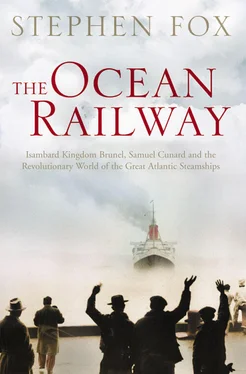The President left New York for home on 11 March 1841, with about 110 passengers and crew. She was sailing low in the water because of heavy cargo and full coal bunkers. Stormy seas on previous voyages had weakened and twisted the wooden hull, perhaps fracturing the engine frame. (According to an oral traditionlater passed down in the Laird family, shortly after her departure two people – the Smith line’s New York agent and the brother of her latest captain, Richard Roberts – had the same dream on the same night. They saw the President with a confused crowd on her deck and Captain Roberts on the bridge, giving orders. Then the ship suddenly, unaccountably disappeared.)
She steamed into a screeching winter storm. Towards the end of the second day, another ship’s captain sighted the President labouring through a dangerous area between the Nantucket Shoals and George’s Bank, where the Gulf Stream collides with shallow soundings, sometimes generating starkly vertical waves as high as a five-storey house. The other ship’s captain saw the President rising on top of an enormous swell, pitching and struggling violently. Then he lost sight of her. The captain later guessed that she was shipping heavy seas, perhaps to the point of snuffing her boiler fires and leaving her powerless in the storm.
Once again the President was late to Liverpool. Her belated but eventual appearance in the previous November restrained, for a time, the usual worries about an overdue ship. After a month The Times notedher tardiness amid stray rumours that she had been sighted here or there, or hit an iceberg, or come into Bermuda, or run ashore in Newfoundland, or suffered a mutiny, or fallen in with pirates. The line’s London office was besieged by friends and relatives of the missing, hoping for any trace of encouraging news. The late-ship deathwatch stretched on for another month, tighter and more hopeless as time passed to no definite resolution. Queen Victoria, on leaving Buckingham Palace for Windsor Castle, asked that a special messenger be sent to her with any news of the overdue ship. When Fanny Appleton sighted a large iceberg from the Columbia in May, she declared it the ghost of the President. ‘ I do not altogethergive up the President as lost,’ Junius Smith wrote on 14 May, trying to convince himself, ‘and yet I fear there is but slight ground for hope.’
The President had simply disappeared into the North Atlantic, taking 110 people down with her. It was the first transatlantic steamship disaster – and not the last time that the newest, biggest ship on the ocean would steam into a catastrophe.
The competition was dropping away, yet the Cunard Line was going broke. To get his contract, Sam Cunard had offered the government much better terms than the Great Western company’s – impossible terms, it turned out. Even before his ships started running, Cunard asked the Admiralty to halve his winter sailings to once a month. ‘ At the timeI entered into the Contract,’ he explained, ‘steam boats had not crossed during the Winter and I was therefore quite ignorant of the risk and danger I had to encounter indeed I was very hasty in making the arrangement.…In the Winter Season there is not much commercial interest, and no passengers and once a month may, I hope be considered by their Lordships sufficient to cross during the inclement Season of the year – I have not only to contend with the storms on this Coast and on the Atlantic but with the severe Winter weather on the coast of Halifax and Boston… These vessels have cost me nearly double the sum I originally expected and I find my Contract is by no means a favorable one, but I am determined to fulfill my engagements.’ The Admiralty agreedto a monthly schedule from November to February but cut £4000 from Cunard’s already-inadequate annual subsidy.
Back in the optimistic spring of 1839, Cunard when haggling with Napier had guessed that his line would run at an annual profit of almost £41,000. No doubt this figure was inflated to entice Napier and his Glasgow investors; but Cunard surely did not expect to operate at a loss. Over its first nine months, the Cunard Line ran £15,355 in the red. When added to his money problems at home, these losses threatened Cunard with financial ruin. He thought about asking the government for a more generous contract but then decided not even to make the request and perhaps to give up the whole, leaky enterprise.
At this bleak moment in the spring of 1841, his partner David Mac Iver replied to a gloomy letter from Cunard with a reassuring blend of caution and optimism. ‘ The day musthave been cold, I think, or the subject has had a chilling effect over your spirits,’ Mac Iver wrote. ‘It is incumbent on us as shrewd Merchants to have our eyes ever open to the dark side of our doings – there is so much of show, and of the imaginary, in the money matters of steamers… Our own doings, up till now, I rate the experimental; and not sound evidence of our true position or prospects. We have paid, like all beginners in new trades of magnitude, thro costly experience, and are now arrived at that point where we must turn this experience to profit.’ Their ships could not carry much cargo, Mac Iver noted, and only attracted such freight in the summertime. So their only way of increasing revenues was to raise fares; Mac Iver suggested new rates of thirty pounds from Boston and forty pounds, nineteen shillings from Liverpool. Drawing from his years of running a steamship line, and knowing the implacable cycles of that business, he counselled patience: wait for better times.
Cunard, having operated ships for three decades, got the point. He, Mac Iver and George Burns met in London to gather their ammunition. Cunard took the grim statistics of their initial operations over to Whitehall, urging that the contract be doubled to £120,000 a year. The Treasury, not persuaded, asked to see the line’s books; Cunard assented ‘ with pleasure’. After the Treasury’s own inquiry and report, the government granted a new contractraising the annual subsidy to £80,000, with the added stipulation that the Cunard Line build a fifth steamship. ‘ It would have beenwrong to let so important a line drop for want of the necessary support,’ a Glasgow newspaper reported. ‘We have, moreover, reason to know that the Government complimented the contractors, not only for having acted up to the terms of the previous contract, but also for having far exceeded them.’
The new contract of 1841, much less than he wanted, did not ease Sam Cunard’s own financial crisis. He had risked his fortune to start the transatlantic line on terms soon revealed to be disastrous. He was the founder and leader, the man who handled those delicate negotiations with the government. In a humbling act that must have embarrassed him, he had to ask his Cunard Line partners for a personal loan. In September 1841 he borrowed £15,000from them, offering some of his own shares as security, and promising repayment with interest in two years. By the end of the year, Cunard had spent the entire loan on various debts.
Aside from a depressed general cycle in shipping and shipbuilding, Cunard was saddled with wayward investments at home, especially the Prince Edward Island land company. The Young family, his associates-turned-enemies in that venture, were not friendly to Cunard. (At a London party in 1839, William Young and Cunard were dismayed to run into each other. ‘ Sam and Iexchanged very distant bows,’ Young noted in his diary.) As Cunard’s money crisis got tighter and more desperate, William and George Young – by a suspicious coincidence – turned up as the attorneys for his more anxious creditors. ‘ They have beenat different times employed by persons in England,’ Sam objected, ‘and they have resorted to every means in their power to injure me by arresting me and heaping costs upon me. You cannot imagine anything more unfeeling than their proceedings – they hesitate at no act if it will put a few pounds into their pocket.’
Читать дальше












